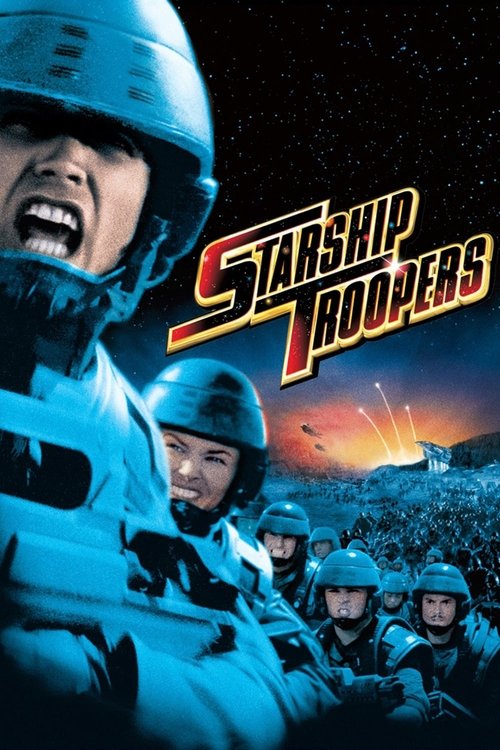
Title: Starship Troopers
Year: 1997
Director: Paul Verhoeven
Writer: Edward Neumeier
Cast: Casper Van Dien (Johnny D. Rico),
Dina Meyer (Dizzy Flores),
Denise Richards (Carmen Ibañez),
Jake Busey (Private Ace Levy),
Neil Patrick Harris (Colonel Carl Jenkins),
Runtime: 129 min.
Synopsis: Set in the future, the story follows a young soldier named Johnny Rico and his exploits in the Mobile Infantry. Rico's military career progresses from recruit to non-commissioned officer and finally to officer against the backdrop of an interstellar war between mankind and an arachnoid species known as "the Bugs."
Rating: 7.083/10
Beneath the Armor: The Sly Satire of Starship Troopers
/10
Posted on July 23, 2025
Paul Verhoeven’s Starship Troopers (1997) is a cinematic chameleon, cloaking its sharp satire in the glossy veneer of a sci-fi action spectacle. Adapted from Robert A. Heinlein’s novel, the film wields its exaggerated militarism and bug-blasting bravado to skewer fascist ideologies and the seductive allure of propaganda. Verhoeven’s direction is the linchpin, deftly balancing camp with critique. His lens transforms what could have been a rote action flick into a subversive mirror, reflecting society’s flirtation with authoritarianism. The screenplay, penned by Edward Neumeier, is a masterclass in tonal tightrope-walking, embedding biting irony in seemingly earnest dialogue. Lines like “Would you like to know more?” delivered through faux-propaganda interstitials mock the manipulative simplicity of state-controlled media, a prescient jab at information overload in the digital age.
The acting, led by Casper Van Dien’s Johnny Rico, embraces the film’s heightened reality. Van Dien’s chiseled earnestness, alongside Denise Richards’ radiant Carmen, plays their archetypes heroic soldier, unattainable love interest with just enough self-awareness to hint at parody without breaking the illusion. Yet, the ensemble’s uniformity, intentional or not, underscores the film’s critique of conformity, with characters like Michael Ironside’s grizzled Rasczak stealing scenes through sheer gravitas. Cinematography by Jost Vacano is another standout, its sleek, militaristic aesthetic amplifying the seductive sheen of the Federation’s war machine. Wide shots of gleaming starships and chaotic bug battles contrast with intimate, almost soap-operatic character moments, creating a visual tension that mirrors the narrative’s duality.
However, the film stumbles in its pacing, particularly in the second act, where repetitive battle sequences dull the satirical edge. The reliance on CGI, groundbreaking for 1997, occasionally feels dated, with some bug designs lacking the tactile menace of Verhoeven’s earlier creature work in RoboCop. Basil Poledouris’ score, though rousing, leans too heavily on bombast, missing opportunities to underscore the irony with subtler cues. Still, these flaws pale against the film’s audacity. Starship Troopers doesn’t just entertain; it provokes, asking viewers to question the glorification of violence and blind loyalty. Its locations barren alien planets and sterile military academies reinforce a universe where individuality is crushed under the weight of collective zeal. Verhoeven’s genius lies in making us cheer for the heroes while questioning the system they serve, a feat that remains as relevant today as it was in 1997.
0
0
